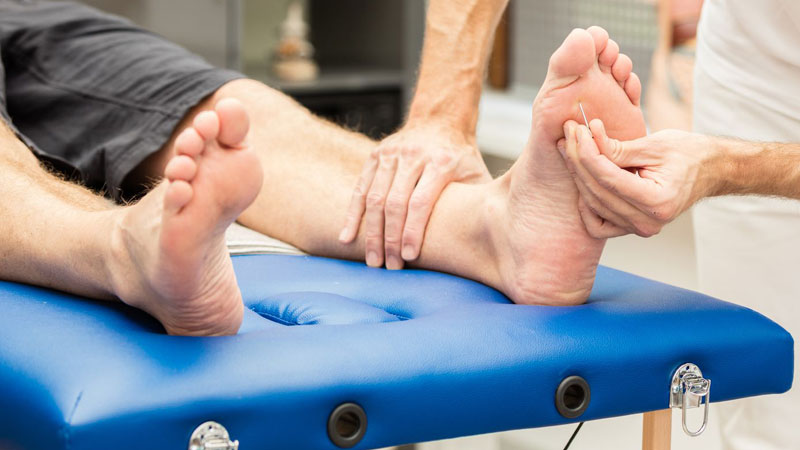NERVE PAIN BOTH HAND AND LEG

NERVE PAIN BOTH HAND AND LEG
Services available:
Proper diagnosis, Nerve test (NCS/EMG), Medical treatment, Medication education, Disease Education, injection for nerve pain , Referral as needed & physical therapy.
F.A.Q.
Your arms, hands, legs or feet? Is your entire body suffering from a stabbing, throbbing or numbness that even the simple act of walking becomes like an everyday chore?
If so, this pain you are feeling is known as neuropathy pain, which is nerve pain as the result of a lack of blood flow to the heart. This can cause certain parts of the body to feel discomfort and pressure making every day activities such as standing, balancing or picking up a spoon near impossible.
Nerve pain, also called neuralgia or neuropathic pain, occurs when a health condition affects the nerves that carry sensation to the brain. It is a particular type of pain that feels different from other kinds of pain.
There are different types of nerve pain, including:
post-herpetic — this can happen after you’ve had shingles (herpes zoster) and affects the same area as the shingles rash
trigeminal— causing pain in the jaw or cheek
occipital — causing pain at the base of your skull that can spread to the back of your head
pudendal — causing pain in the ‘saddle area’ between the legs
Some of the more common signs to neuropathy pain:
- Numbness or tingling in feet and hands
- Loss of balance and falling
- Throbbing and sharp pain
- Extreme sensitivity to touch
- Dropping things with your hands
- Muscle weakness
- Heavy feeling in arms and legs
- Dramatic drop in blood pressure
- Difficulty digesting
- Excessive sweating
Nerve pain is common in most diabetic and chemotherapy patients, as well as individuals suffering from a broken ankle or foot. Nerve pain often feels like a shooting, stabbing or burning sensation. Sometimes it can be as sharp and sudden as an electric shock. People with neuropathic pain are often very sensitive to touch or cold and can experience pain as a result of stimuli that would not normally be painful, such as brushing the skin.
It’s often worse at night. It might be mild or it might be severe. People who have nerve pain often find that it interferes with important parts of life such as sleep, sex, work and exercise. Some people with nerve pain become angry and frustrated, and may have anxiety and depression.
Recognizing nerve pain is the first step to getting the help you need.
Nerve pain can be due to problems in the central nervous system (brain and spinal cord), or in the nerves that run from there to the muscles and organs. It is usually caused by disease or injury.
Common causes include:
- an injury to the brain, spine or nerves
- poor blood supply to the nerves
- heavy drinking
- phantom pain after an amputation
- vitamin B12 or thiamine (vitamin B1) deficiency
- certain medicines
Conditions that can cause nerve pain include:
- infections such as shingles and HIV/AIDS
- multiple sclerosis
- diabetes
- stroke
- cancer and its treatment with radiation, surgery or chemotherapy
- trapped nerves, such as in carpal tunnel syndrome
There are other conditions associated with nerve pain.
Sciatica is pressure on the nerves of the lower back that causes pain down the leg. The pain can be accompanied by pins and needles, numbness or weakness in the leg.
Fibromyalgia is a chronic pain syndrome associated with burning or aching pain in different parts of the body. The cause is not well understood, but it can be triggered by emotional distress and poor sleep. There may be genetic factors, too.
Peripheral neuropathy occurs when the peripheral nerves that connect the brain and spinal cord to the rest of the body are damaged. It’s caused by diabetes, autoimmune diseases and other conditions.
The main way your doctor will diagnose nerve pain is by listening to you and examining you.
In the examination, they will probably test your nerves by testing the strength of your muscles, checking your reflexes, and by seeing how sensitive it is to touch.
You may be asked to have tests like:
- blood tests to check your general health and look for underlying conditions
- nerve conduction studies which measure how quickly your nerves carry electrical signals
- a CT scan or an MRI scan to look for anything that could be pressing on a nerve
There are many ways to treat nerve pain. Treating the underlying cause, if there is one, is the first step.
Painkillers and a range of different medicines can help, as can non-drug treatments like exercise, acupuncture and relaxation techniques.
Nerve pain can be difficult to treat. Any underlying conditions such as diabetes and vitamin B12 deficiency can be managed. Otherwise, treatments aim to directly ease the pain. Options include medicines and non-medicine strategies.
Medicines:
Some nerve pain will be controlled with simple painkillers like aspirin, paracetamol or a non-steroidal anti-inflammatory drugs (NSAIDs). Stronger painkillers such as opioids are sometimes used, but these have significant side effects that can be harmful especially in the long term, and can be addictive. Many other medicines can be effective against nerve pain.
Non-medicine treatments:
Non-medicine treatments can help people to understand and cope with the pain. They include:
- education and counselling
- exercise
- acupuncture
- relaxation techniques
- psychological treatments to help you feel in control of your pain and reduce distress
- transcutaneous electrical nerve stimulation (TENS) to block the transmission of pain sensations to your brain
